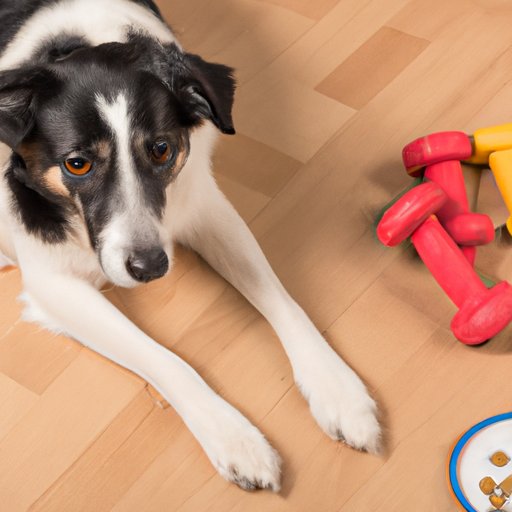
Introduction
While obesity is a common problem among dogs, some dogs are underweight and need help gaining weight to reach their optimal health. In this article, we’ll explore various methods to help your underweight dog gain weight and maintain a healthy weight. We’ll also discuss healthy weight ranges and various medical factors that could affect your dog’s weight.
Diet Changes
One of the first steps in helping your underweight dog is to alter their diet. To promote weight gain in your dog, you may need to increase the amount of food they eat and switch to a more calorie-dense food.
Increasing the Amount of Food They Eat
If your dog isn’t eating enough, you can increase their meal portions to help them gain weight. Start by gradually adding a small amount to each meal, and slowly work your way up until you reach the desired portion size. You might also consider splitting their meals into smaller, more frequent feedings throughout the day.
Switching to a More Calorie-Dense Food
Feeding your dog food that contains extra calories is another way to help them gain weight. Look for dog food specifically designed for weight gain or high-calorie formulas. You should also consider the quality of the food you’re feeding your dog to ensure they’re receiving all the necessary nutrients for their optimal health. Speak with your veterinarian to identify the right food to help your dog gain weight without risking their overall health.
Treats and Snacks
Feeding your dog treats and snacks is a crucial part of their diet, especially if they need to gain weight. When choosing snacks, it’s essential to choose high-protein and healthy fat options that are safe for pets.
Examples of High-Protein and Healthy Fat Snacks
Consider giving your dog small pieces of cooked chicken or turkey breast, boiled liver or kidneys, cottage cheese, eggs, or plain yogurt with live active cultures. These foods are all high in protein and healthy fats that can aid in weight gain. Avoid feeding your dog table scraps or foods that are high in salt or sugar, as these can be harmful to your dog.
Mealtime Tactics
In addition to altering their diet, there are several tactics that you can use during mealtime to encourage your dog to eat and gain weight.
Warming Up Their Food
Dogs tend to prefer warm or room temperature food over cold food. If you feed your dog wet food, try heating it up lightly in the microwave or on the stove to warm it up. This will stimulate your dog’s appetite and encourage them to eat more.
Hand-Feeding
Hand-feeding your dog is another way to encourage them to eat. Try offering them a small amount of food by hand and making positive, happy noises to encourage them to eat. Combining treats and hand-feeding can make mealtimes more enjoyable for your dog and help them gain weight.
Supplements
Supplements can help support your dog’s weight gain efforts by providing additional nutrients and calories they need. While supplements aren’t a replacement for a wholesome diet, they can help your dog reach their optimal weight.
High-Protein Powders
If your dog needs more protein, consider adding high-protein powders to their diet. Many supplements specifically designed for dogs can provide beneficial nutrients and proteins that can help your dog gain weight.
Omega-3 Fatty Acids
Omega-3 fatty acids can improve your dog’s overall health and promote weight gain by increasing their appetite and reducing inflammation. Consider adding fish oil or flaxseed oil supplements to your dog’s diet or feeding them foods rich in Omega-3 fatty acids, like salmon or sardines.
Supplementary Exercise
In addition to altering their diet and supplements, incorporating light exercise into your dog’s routine can help stimulate their appetite and promote weight gain.
Light Activity Between Feedings
Try taking your dog on walks 5-10 minutes after each meal to help stimulate their appetite and digestion. Keep in mind that too much exercise can be counterproductive. Consult with your veterinarian about the right amount and type of exercise for your dog.
Medical Factors
There could be various medical factors that affect your dog’s ability to gain weight. If you notice any unusual changes in your dog’s health and appetite, it’s essential to consult your veterinarian to rule out any medical conditions that could be causing your dog’s weight loss, such as allergies, infections, or underlying diseases.
Conclusion
Helping your underweight dog gain weight and maintain a healthy weight is crucial for their overall health and well-being. Altering their diet, feeding them healthy, high-calorie snacks, and using mealtime tactics can help encourage your dog to eat more. Supplements and light exercise between meals can also help stimulate their appetite and support their weight gain efforts. Lastly, seek medical attention if you observe any unusual weight or appetite changes in your dog. Patience and consistency are essential in the weight gain process, so stick with your efforts to help your dog reach their optimal health.




